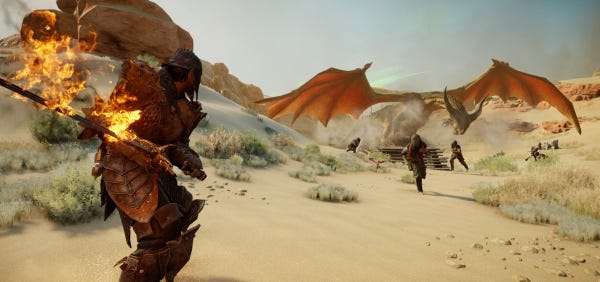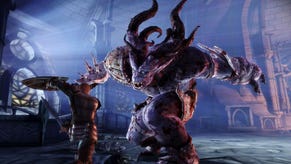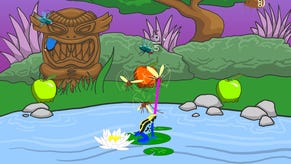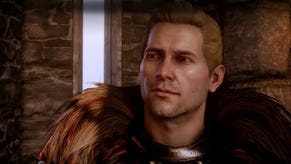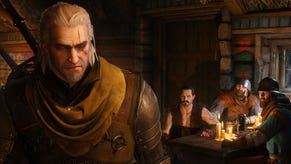Eyes On: Dragon Age - Inquisition
The Dragon Age Reformation
Sometimes you realise it's just a tricky situation for a developer. You want to show your game, but you're a year away from finishing, and you've got a year's worth of press to rustle yet. So what do you show? You pick between a few reveals, a lot of what people were expecting, and a healthy dose of ambiguity. And so it was for BioWare's first reveal of in-game footage from RPG epic Dragon Age: Inquisition. Everything we learned is below.
There was something that went unsaid throughout the whole of the presentation. The name of a game that you'd imagine would be quite relevant. "Dragon Age II". For some reason it didn't come up. While BioWare have never openly acknowledged that it was an expansion pack stretched breakingly thin to be a disappointing sequel, there was no subtlety about Inquisition being presented as the sequel to Dragon Age: Origins. Set many years later, and casting you as a brand new character, they promised it would share some characters, but not many, and continue some stories, but not many. Instead the pitch here appeared to be one of a mostly wholly new tale to be told in the setting they spent ten years crafting.
We heard the buzz phrases. "Vast fantasy world" was said at least twice, while "The game we've been striving to make since we began the series" was thrown out near the start. But the odd thing was, it sounded as if they meant it, too. BioWare are bruised at the moment. Fan feedback has been, shall we say, eccentric of late, and the triple whammy of Dragon Age II, Mass Effect 3's ending brouhaha, and the relative disappointment of The Old Republic's performance, can't have done good things for morale. But there's something important about Dragon Age. It was a game that marked a moment for the company, a final step away from licensed IPs after Mass Effect cleared the scifi decks, from a time when decisions had to be run past the likes of the scary coastal wizards, or human neckbeard George Lucus. They were entirely within their own creative freedom. It now feels like an important flag, and they're waving it once again.
Tales of Grey Wardens and blights are in history now, with the world facing a new threat - a Fade Rift. The Fade is the magical realm that exists alongside our own, filled with horrors and abominations. It is the place with which mages are most in touch, and hence why mages are so feared and vilified in the world. And now it's torn open, and all manner of beasties are pouring in. And that's trouble.
However, rather oddly, little seems to be being done about it. Each clan of people, each enclaved race, seems extraordinarily wrapped up in their own disasters, and none is able to tackle the Fade troubles as well. And BioWare were keen for us to know that this just seems a little bit too convenient. So you, whomever you might decide to be (and this time out that can be Human, Elf, Dwarf or new to Inquisition, Qunari), are heading up a new Inquisition, to Get. Shit. Done.
This doesn't mean, I was promised by producer Cameron Lee, that the game will be about solving the issues of each race and then having them join an army to fight the larger evil. That would have felt awfully familiar, but we're assured that's not what's happening here. What is happening, of course, we have no idea. Because of that year-away thing I mentioned. So instead we're asked to get excited about the sizes of things, and how the maps are going to be so big we'll need horsies to get about. We weren't shown horsies, however, so instead watched a chap jogging down a very pretty, very long grassy path, on his way from one moral dilemma to the next.
The section shown to us took place in Crestwood, within the familiar settings of Ferelden. This area, described as being "medium sized", although later said to be a lot smaller than another "medium sized" area, takes about fifteen minutes to run across. And within the Frostbite 3 engine, certainly looked lovely. Well, lovely for the tail-end of the current console generation limiting a PC's options kind of lovely, which is still very lovely. What we were shown was in fact playing on a PC, and indeed the game will be released for the next crop of consoles, but this very early alpha footage certainly wasn't showing off anything that especially blew me away. Then again, we're told that much is due to change. But then again again, we're always told that. Still, lovely.
Crestwood was under multiple threats. A Fade Tear (tare, rather than teer) had opened up nearby, and needed dealing with. Meanwhile a bunch of baddies were sailing in by boat, and sieging the town. And a keep that's strategically important to you was looking likely to get taken. A choice was presented, and the player was asked to decide between saving the keep, or the townspeople. BioWare - the scoundrels - chose the keep. On the way past we saw the awfulness taking place in Crestwood village, the people getting slaughtered, and a dwarf in our company - one Varric Tethras - was appealing to our humanity to change our minds. BioWare - the libertines - walked on. We were told that these decisions would have impacts not only on our relationships with companions, but also on the world as we progressed. It certainly seemed to have an impact on the citizens of Crestwood and their continued plans for breathing.
Keeps are rather important, as it happens. Whether they're as important as an entire town of innocents is up to you, but they play a significant role in what precariously encroaches on strategic tactics. As you gain control of such places, you can choose what they're for. You might set them up for military training, and give a real emphasis on that to how you play. Or you can set them up essentially as mines, rooting out sulphur, for alchemic mage business. Or they can rebuild stuff, like a shattered colossus apparently, which I'm told is good for morale. It seems that how you tailor these will affect the type of approach you take to the game, although the complexities of this don't yet seem quite clear. And getting into one seemed to offer a range of choices too, with apparently multiple ways to approach your conquest, some depending upon the unique talents of your crew. And when one of your crew appears to be DA2's Cassandra Pentaghast, those can be some pretty unique talents.
And yes, you can relax back in your seat. The combat has its vital strategic elements back too. I've waited a thousand words to tell you, just like BioWare waited about 30 minutes into their presentation before putting my mind at ease. The ridiculous choice to limit the paused combat and party commands from DA2 is history, and it's all back as it should be here. But boy, did they push their luck with that. My notes about combat read, chronologically:
"Combat appears to be VERY generic, real-time."
Then later,
"Can pause combat, but looks perfunctory."
Until finally,
"Tactical mode back! Top-down if wanted."
Phew. That earlier combat they showed was very ordinary third-person melee bashing, and had me properly worried. However, having seen a battle orchestrated by an overhead flying bird sergeant (it is my assumption that all overhead battle instructions are given by a bird with military training), I looked back on the bashing and was rather glad to have it as well.
You can play as any member of your team, which looks like it will contain up to four, and control their every actions down to the footstep, or leave them to use their common sense and attack as they see fit. Whether the full-on programmable AI tactics of DA1 will be in there we didn't see, but I'd be surprised if they weren't. As it was, what we were told would have been a lengthy and difficult fight in real-time was seen of swiftly by giving precise instructions to each team member, including sending Varric around the side to flank the enemy.
Throughout, what BioWare most wanted to tell us, but weren't prepared to show us, was just how significant your impact on the world can be. "Tough, hard-hitting, with long-lasting consequences" they said. Packed with "dilemma" they said. "Complex choices" they added. "What kind of leader do you want to be?" they appealed. Trying to nail this down a bit more with Cameron Lee, it seems this means that they're aiming to embellish on the studio's biggest talent here: letting you vary the way you're going to experience the story they were going to tell you either way. It's just this time out, they're suggesting those variations might be more significant than we've seen before.
And at this point, I think, it's worth noting the name. 'Inquisition' is a pretty loaded word. Most people's minds will go immediately to Spain's previous approach, and if you can get past the Monty Python references, it takes you to a pretty ugly place. But Lee was keen to point out that an inquisition doesn't have to go that way. As he puts it, "you can be an arsehole, or be really cool." Dragon Age's The Inquisition was originally created thousands of years ago, to address a serious issue back then, but over time it seemed it weakened, and then in the ultimate abandoning of its independent status, became part of the world's religious organisation, the Chantry. And then went away. You're now bringing it back. Times are terrible, and your character has head enough. Or to put it in Lee terms, "You just go, fuck this, going to do something about it." How you go about it, it seems, should define the nature of your inquisitory ways.
What else can I tell you? You'll no longer auto-heal between battles. That's rather significant, really, and belies an attempt to give the combat more gravitas - an effort redoubled when they say that health potions won't be in plentiful supply either. Locations won't scale to your level, so wander somewhere tough and you're going to get slaughtered, and need to look elsewhere. And the world is partly destructible, which they showed off in a couple of ways. Firstly, a combat sequence inside a keep had a few enemy archers stationed on an overhead bridge. So taking out the bridge supports during the fight saw them fall to their deaths. And taking some initiative seems effective too - when approaching Crestwood we saw enemy boats arriving into port, so when passing the docked ships, firebombs were found in the inventory and used to set them on fire. That would prevent a tougher battle later on, we were promised, as it meant those ships wouldn't be able to deliver reinforcements. Oh, and dragons.
At this point the game's interface was obviously designed for a console (despite, as I say, being demoed on PC), but strong promises were made that the PC's would have a completely unique design by next Autumn. It makes sense to ensure the game can be operated via the simplicity of a controller, and then have the complexity added back in for us after. They nailed that with DA:O (somewhat screwing the console version, leaving out the pausable battles!), so there's no reason to think it won't happen again here.
Conclusions can only be hopes, at this point. We were told enough for me to ramble on this long, but none of it gives a clue as to whether it will be good. Because of course the reality of playing a Dragon Age game is as much having a long conversation, faffing about in your inventory for a bit, and then visiting a library, as it is epic battles. When demoing such a game, with someone else making the decisions, the emphasis tends to fall on what is - ultimately - one of the less important aspects of how you'll play the game. The rest, the meat, is still promises. But with three years going into it, on top of the already vast, vast stretches of details and lore that already exists, they've at least this time given themselves the time and money to face the task. It's pretty clear they care very much about getting it right, and that they've listened and learned after the misfire of DA2. But we've a year to wait to find out how it will all come together. I'm left optimistic, but uninformed.
